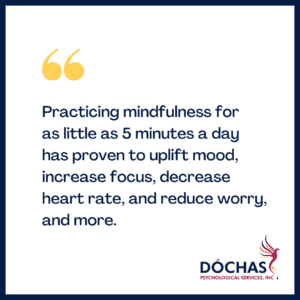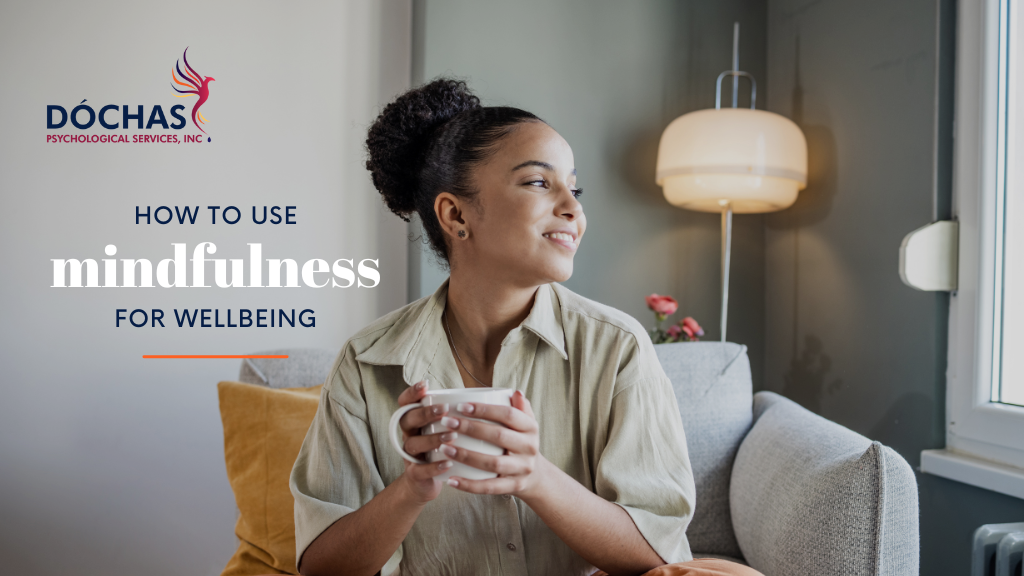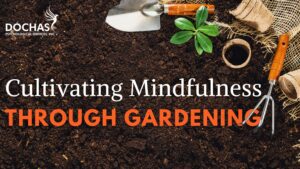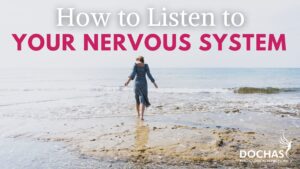Did you know that practicing mindfulness for as little as five minutes a day has proven to uplift mood, increase focus, decrease heart rate, and reduce worry, amongst many other benefits? It’s Stacey on the Dóchas blog today, and I’m going to talk about mindfulness—specifically, mindfulness and breathing techniques. Is it possible to breathe your way to wellness? Yes, it is! I’ll explain how.

But first, what is mindfulness? Mindfulness can be thought of as an act that aids in focusing your awareness into the present moment, to calm the mind, to bring clarity, and to acknowledge your feelings, thoughts, and bodily sensations. Mindfulness tools can be used in everyday life as a form of self-care. Forms of mindfulness can include, but are not limited to, breathing techniques, visualization, meditation, grounding, body scan, journaling, colouring, mindful eating, listening to music, progressive muscle relaxation, and movement/exercise. Mindfulness is not limited to a certain time or place, as certain options can be practiced anywhere and at any time.
Breathing is the perfect example of this! Think about it. Every moment of every day we are breathing without much notice. It is an automatic operating system our body does without us having to consciously remember. However, breath has shown powerful benefits when we do decide to pay attention and take control in moments of stress or to simply ground ourselves when we feel the need. Deep breathing allows more air to circulate through the body and triggers the parasympathetic nervous system to help the brain and body reach a state of calm. Health benefits of incorporating a daily deep breathing practice include lower blood pressure, reduced symptoms of depression and anxiety, and reduced tension in the body. This can result in a decrease in headaches, relieve symptoms of irritable bowel syndrome, and reduce the number and severity of hot flashes.
But how do you accomplish this? What are the tricks to breathing? It is quite simple and there are several techniques to choose from.
Box Breathing
This is a technique used by Navy Seals, known as box breathing. This includes four steps while focusing on your breath:
- Inhale through your nose as you slowly count to 4
- Hold your breath for a count of 4
- Slowly exhale for another count of 4
- Hold your breath again for a count of 4
- Repeat for three to four rounds
5-5-8-2 Method
Another technique that is more advanced is called the 5-5-8-2 method. This technique uses a longer exhale, which helps the body to reach the relaxation state more quickly. Slow and controlled inhales, followed by long exhales move the nervous system away from a distressed state (fight-or-flight) and towards rest-and-digest. While focusing on your breath follow these four steps:
- Inhale through the nose while counting to 5
- Hold your breath for a count of 5
- Slowly exhale to a count of 8
- Hold your breath at the end of exhale for a count of 2
- Repeat for three-four rounds
These are just a couple of the many breathing techniques that can be used anywhere at any time. To have such a handy skill readily available can bring ease to your mind! In an anxious state, you naturally use shallow, upper chest breathing. So learning to take advantage of the deep belly breath by inhaling fully through the nose will encourage the body to relax, in addition to bringing a range of health benefits.

If you would like guidance in learning mindfulness techniques whether it’s breathing or a more preferred modality, I would be happy to help. Reach out to Dóchas with any questions you might have, at 780 446 0300 or drop a line at info@dochaspsych.com.
About Dóchas Psychological
Dóchas Psychological Services is a well-established and trusted therapy clinic located in Spruce Grove, Alberta. At Dóchas we value the idea that everyone deserves a safe space. Through connection and education, our team works hard to build a trustworthy relationship with each of our clients. It is our goal to create a community for our clients to feel like they belong.
Disclaimer
Information provided through Dóchas Psychological Services blogs or vlogs is meant for educational purposes only. They are NOT medical or mental health advice. You can read more about our disclaimer here.








